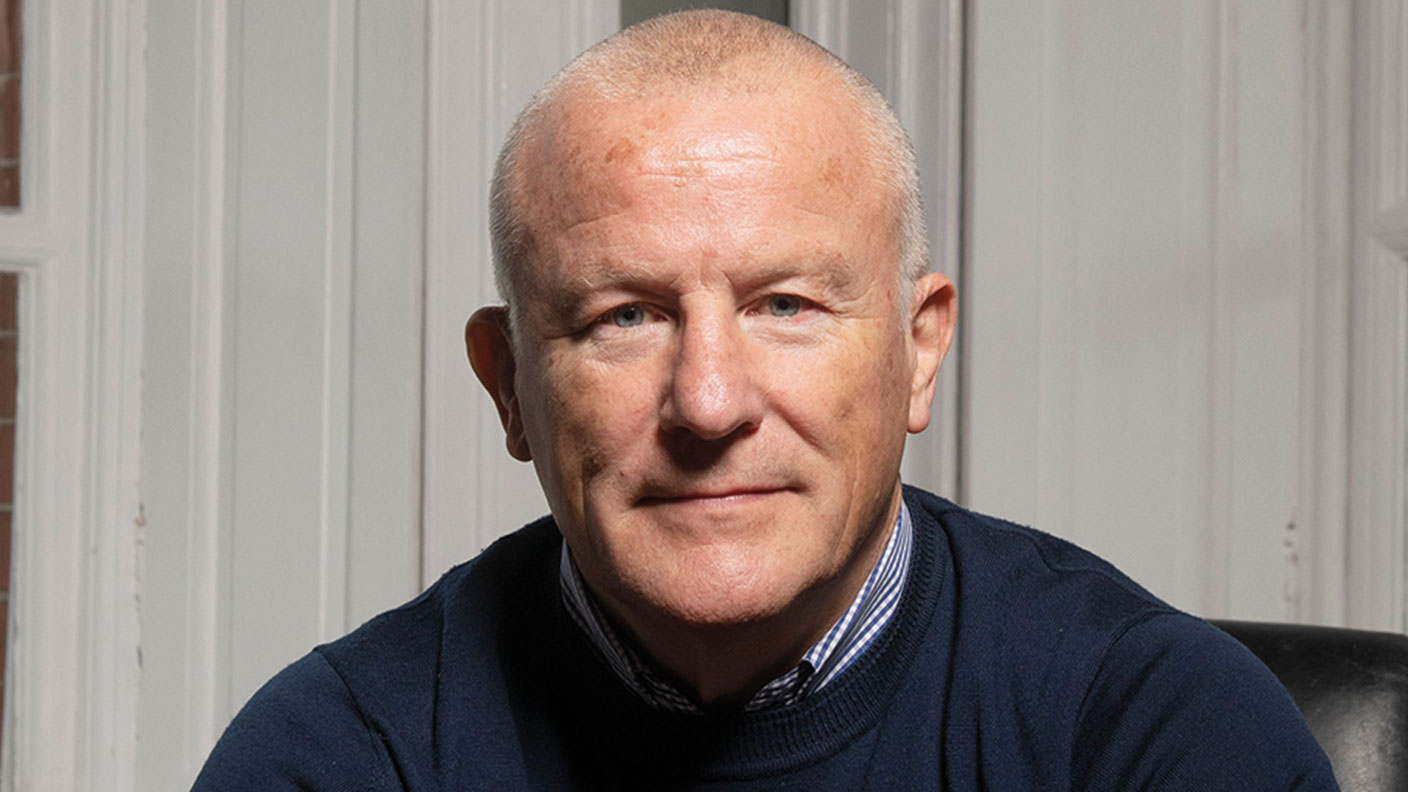What Neil Woodford’s crash landing means for your money
This week, former star fund manager Neil Woodford shocked markets by “gating” his flagship fund. John Stepek and Sarah Moore look at what went wrong, while Max King looks at how Woodford’s former colleagues are getting on now.
Get the latest financial news, insights and expert analysis from our award-winning MoneyWeek team, to help you understand what really matters when it comes to your finances.
You are now subscribed
Your newsletter sign-up was successful
Want to add more newsletters?

Twice daily
MoneyWeek
Get the latest financial news, insights and expert analysis from our award-winning MoneyWeek team, to help you understand what really matters when it comes to your finances.

Four times a week
Look After My Bills
Sign up to our free money-saving newsletter, filled with the latest news and expert advice to help you find the best tips and deals for managing your bills. Start saving today!

"A bonfire of reputation and a terrible moment for investor confidence" is how one "veteran" fund manager described it to the Financial Times this week. "I can't remember anything quite like this," another manager, Peter Walls of Unicorn Mastertrust, told Citywire. They were, of course, referring to the "gating" of Neil Woodford's flagship Woodford Equity Income Fund this week, which left investors large and small (including Kent County Council) unable to withdraw their money until further notice.
What went wrong?
Neil Woodford gained his reputation as a "star" while working at Invesco Perpetual, from 1988 to 2013. His big call was to avoid the tech bubble (and bust) and buy out-of-favour tobacco stocks (see below). He beat the market, and in 2014, with a track record and many grateful investors in tow, launched his own funds, heavily backed by Britain's biggest broker, Hargreaves Lansdown.
He also changed style. The flagship fund was called "Woodford Equity Income", but dividends came from a small number of high-yielding holdings while much of the rest of the fund was invested in early-stage biotech and "disruptor" stocks, some of them unlisted.
MoneyWeek
Subscribe to MoneyWeek today and get your first six magazine issues absolutely FREE

Sign up to Money Morning
Don't miss the latest investment and personal finances news, market analysis, plus money-saving tips with our free twice-daily newsletter
Don't miss the latest investment and personal finances news, market analysis, plus money-saving tips with our free twice-daily newsletter
The fund beat the FTSE All Share in its first two years, bolstering Woodford's reputation, and by May 2017, assets under management (AUM) had hit a peak above £10bn. By then, however, the fund was starting to lag (in the year to 31 March 2017, it returned 12% vs more than 20% for the FTSE All Share), and it only got worse. As Daniel Grote notes on Citywire, investors began to pull out that summer, unnerved by a profit warning from subprime lender Provident Financial, then one of Woodford's biggest holdings. Other warnings followed, and by March 2018, weak performance plus redemptions had seen AUM fall to below £7bn. By the time the fund was gated, it was below £3.8bn.
Woodford is hardly the first active manager to make dud calls. The real problem was liquidity or lack of it. Woodford Equity Income is an open-ended fund. For a detailed definition see here, but in practice it meant that as investors pulled money out, Woodford had to sell out of his liquid (easily sold) equities to repay them. This made it increasingly hard for him to keep the chunk of his fund invested in illiquid or unquoted stocks to below the regulatory limit of 10%. So he turned to ever more elaborate methods of sticking to the letter, if not the spirit, of the rules. He listed some stakes on the Guernsey stockmarket (fine for regulatory purposes, but doesn't do much for liquidity), and swapped stakes in five unquoted companies for shares in his own Patient Capital Investment Trust. This controversial deal made the extent of the problem very clear which only exacerbated the "run on the fund".
The straw that broke the camel's back appears to be the news that Kent County Council decided to pull out £250m from the fund. Dealing was suspended to allow Woodford "time to reposition the element of the fund's portfolio invested in unquoted and less liquid stocks, into more liquid investments."
What now?
If you own the fund, there's not much to do but wait. It has been suspended for at least 28 days likely longer. The money is still there, and the fund is being priced daily, so you'll be able to keep an eye on it, but you can't get at it. The suspension gives Woodford breathing space to restructure, but it's never good to be viewed as a forced seller. And odds are that people will queue up to pull their money out when the doors open again, whatever they claim now. We look at the effect on his other funds below.
How Hargreaves Lansdown backed a losing horse
"If Woodford is a fallen superstar then Hargreaves was his agent," as Matthew Vincent puts it in the FT's Lombard column. The online investment platform's "imposing marketing machine whirred into action" at the launch of all three of Woodford's funds, notes Citywire's Daniel Grote. In the Equity Income Fund's first full year of operation in 2015, Hargreaves clients owned more than a third (38%) or £3.1bn, of the fund. And by the end of last year, this figure still stood at 31%. Hargreaves clients also own around two-thirds of the Woodford Income Focus Fund. The company's backing of Woodford's funds is "so significant" that it is deemed a "related party", in that it controls more than 20% of the shares, and so must disclose its holding in annual reports, notes Grote. No other broker has this status. Between 2015 and 2018, Woodford "would have generated roughly £50m in fees from Hargreaves clients alone".
Meanwhile, although rival brokers AJ Bell and Charles Stanley dropped Woodford's Equity Income Fund from their best-buy lists last year following a long period of underperformance, both funds made the cut at Hargreaves, even when it reduced its recommended list from 150 names to just 50. Woodford's firm meanwhile increased the discounted ongoing charge figure available to Hargreaves clients from 0.6% (relative to a standard 0.75% charge) to 0.5%. At the time, the fund supermarket said that it felt it was "simply too early to give up" on Woodford, and drew attention to his previously demonstrated ability to make big economic calls which paid off. Since the suspension, of course, Hargreaves has removed both the Equity Income and Income Focus funds from its Wealth 50 list.
What about Neil Woodford's old funds?
By Max King
Before Neil Woodford left Invesco Perpetual in 2013, he worked closely with Mark Barnett. Woodford managed £30bn in four open-ended funds, two funds for St James' Place and the £1.3bn Edinburgh Investment Trust (LSE: EDIN), won from Fidelity in 2008. Barnett managed three trusts, including Perpetual Income & Growth (LSE: PLI) and Keystone (LSE: KIT), plus various other funds. Though he worked somewhat in Woodford's shadow, Barnett's returns were actually better in the later years so when Woodford left, it seemed natural for Barnett to take over the funds, minus the investors who cashed in to follow Woodford.
While Woodford's new venture has struggled badly, so have the funds all UK specialists he left behind. EDIN has returned a respectable 24% over five years, but only 5% over three; PLI, 10% over five years and zero over three; and KIT, 18% and 10%. These are all well behind the underwhelming performance of the FTSE All Share index (29% over five years, 28% over three), and the sector averages. In April 2017, Barnett handed management of KIT over to James Goldstone but its performance hasn't improved.
Cheap, but not necessarily good value
The formula behind Woodford and Barnett's success was to focus on value, income and recovery. In the late 1990s, they avoided the technology, media and telecoms sector, thereby outperforming in the 2000-03 bear market. Thereafter, suspicious of banks, despite their generous yields, they steered clear, reducing the hit from the global financial crisis. They were quick to recognise that although the tobacco industry was heading for decline, it would become hugely profitable due to consolidation; cost cutting (notably on marketing, as it was banned around the world); an end to diversification; and the limitation of legal action to the pre-health warning era. For many years, the sector, including US companies, accounted for more than 20% of their funds.
But success made Barnett complacent and PLI acquired a growing tail of holdings that didn't belong in such a portfolio: eclectic investment funds, high-yield property trusts and speculative life sciences companies. These holdings are still in PLI and EDIN, though they are not among the top holdings, and few are unquoted. The damage to performance will have been less than for Patient Capital but is still notable.
Among the larger holdings, there is remarkable uniformity between the two trusts, with eight of the top ten holdings in common. The other two top ten holdings of each are still held by the other, but outside the top ten. Tobacco still features prominently, with BAT, Imperial and Altria all held, though the sector peaked in 2017. Banks are still absent other than a small holding in RBS, but insurance is well represented, notably Aviva and investment giant Legal & General. BP and Shell continue to struggle, as do Tesco, Next and the pharmaceutical majors. These companies may look "cheap" but that doesn't necessarily make them good value.
Overly devoted to failing stocks
Recovery hopes probably account for holdings in BT, Capita and Provident Financial but there is little sign of progress in any of them. Barnett expresses confidence that the domestic UK market will have a bounce-back, helped by undemanding valuations but his portfolio of mega-caps, lame ducks and oddball smaller companies doesn't inspire confidence. KIT looks little better and is burdened by £31m of expensive fixed-term debt.
KIT, with £290m of assets, yields 4% and trades on a discount to net asset value (NAV) of more than 15%. PLI, with £1bn of assets, trades on a 12% discount and yields 4.7%, while EDIN, with £1.5bn of assets, trades on a 10% discount and also yields 4.7%. Chris Brown of brokers JP Morgan Cazenove, "has sympathy with the manager's view that performance is due a bounce-back" and has a mild preference for EDIN. The UK market, beset by political issues, may indeed be due a rebound but the Invesco trusts are not necessarily positioned for it. Over time, the stocks that drive bull markets change, but Barnett sticks devotedly to companies that have tried but failed to regenerate themselves. Don't be tempted by the discounts and the yields until there is some evidence that lessons have been learned.
What if you own Woodford's other funds?
Woodford Investment Management offers three funds the suspended Woodford Equity Income; Woodford Income Focus; and Woodford Patient Capital Trust (LSE: WPCT). The Income Focus fund is far more liquid than its troubled partner (as is the case for the funds Woodford runs for St James's Place), so while we're not wild about it (too many housebuilders), if you're a fan, there's no rush to exit.
WPCT is an investment trust, and so doesn't have the liquidity issues of the Equity Income Fund. However, there is a huge overlap between the two analysts at Stifel put it at an extraordinary 89% (accounting for use of gearing, or borrowed money) which could mean that the trust's underlying portfolio suffers in the event of any "fire sale" held by Woodford as he restructures his other fund. That's not to mention the risk of Woodford selling the 9% stake he owns in WPCT as he tries to raise money to fund redemptions.
We've never been big fans of this trust. That said, every fund has its price, and it could end up being an interesting special situation (or takeover target) in the future. But given how distracted Woodford must be, we'd be very wary of buying in, even at the current record-low share price.
Get the latest financial news, insights and expert analysis from our award-winning MoneyWeek team, to help you understand what really matters when it comes to your finances.
MoneyWeek is written by a team of experienced and award-winning journalists, plus expert columnists. As well as daily digital news and features, MoneyWeek also publishes a weekly magazine, covering investing and personal finance. From share tips, pensions, gold to practical investment tips - we provide a round-up to help you make money and keep it.
-
 Should you buy an active ETF?
Should you buy an active ETF?ETFs are often mischaracterised as passive products, but they can be a convenient way to add active management to your portfolio
-
 Power up your pension before 5 April – easy ways to save before the tax year end
Power up your pension before 5 April – easy ways to save before the tax year endWith the end of the tax year looming, pension savers currently have a window to review and maximise what’s going into their retirement funds – we look at how
-
 Neil Woodford’s back – but has he really learned anything?
Neil Woodford’s back – but has he really learned anything?Opinion Disgraced fund manager Neil Woodford is planning a comeback. But he doesn’t seem to have learned much from his many mistakes. So why would anyone invest with him now?
-
 Neil Woodford’s back – but sometimes sorry isn’t enough
Neil Woodford’s back – but sometimes sorry isn’t enoughAdvice Neil Woodford’s funds blew up in 2019. Now he is on the comeback trail. But his apologies are unconvincing.
-
 Woodford investor? Your first payment is coming soon
Woodford investor? Your first payment is coming soonNews Private investors left stranded by the collapse of the Woodford Equity Income fund will soon be getting at least some of their money back. But they will have to wait a while longer to see how much more – if any – they will receive.
-
 Neil Woodford continues to cast a shadow over his successor at Invesco
Neil Woodford continues to cast a shadow over his successor at InvescoFeatures Mark Barnett, former star manager Neil Woodford’s successor at Invesco, has applied the same formula, and is struggling.
-
 Is it time to buy Patient Capital Trust?
Is it time to buy Patient Capital Trust?Features Neil Woodford’s Patient Capital Trust has been taken over by asset manager Schroders. The share price has surged - but should you buy in? John Stepek looks at the trust’s prospects.
-
 Neil Woodford: no silver lining for his investors
Neil Woodford: no silver lining for his investorsEditor's letter Neil Woodford made every mistake it is possible to make as a money manager. And his investors have been stiffed. But however wrong it all went, Woodford never stopped taking the fees.
-
 Woodford believed his own hype – now his investors are paying the price
Woodford believed his own hype – now his investors are paying the priceFeatures Neil Woodford was once one of the brightest stars in Britain’s investment firmament. Then he came crashing down to earth. John Stepek explains what went wrong.
-
 Woodford’s empire collapses – what happens to his investors now?
Woodford’s empire collapses – what happens to his investors now?Features With Neil Woodford getting his marching orders and his funds being shut down, John Stepek explains what it means for his former empire, and for those with money locked in.

